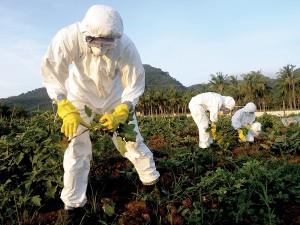Genetically engineered crop research backed

GENETICALLY MODIFIED Activists in hazmat (hazardous material) suits from the environmentalist group Greenpeace uproot genetically engineered Bt eggplant, locally known as ‘‘talong,” from a field trial site in Bay Laguna province, in this 2011 photo. ARNOLD ALMACEN
MANILA, Philippines—One of the country’s leading scientist-educators recently lauded the strong support given by the academic and science communities to researches on agricultural biotechnology.
Emil Javier, former president of the University of the Philippines (UP) and former chancellor of UP-Los Baños, said the support was crucial in the face of “organized opposition” to ongoing field trials of crop varieties developed through biotechnology.
Javier cited the support of the UP-Los Baños community, the University of Southern Mindanao (USM), the National Academy of Science and Technology and other mainstream science communities in the Philippines and abroad.
In a statement, he noted an ongoing campaign against genetically engineered crops in the country led by Europe-based militant group Greenpeace. The said group led a 2011 raid on a government-run trial farm in Los Baños, Laguna. A similar raid was done recently by local groups identified with Greenpeace on an experimental farm in Bicol.
Javier earlier explained that research on the application of modern biotechnology in agriculture was aimed at developing crop varieties that require minimal or zero use of chemical pesticides. Biotechnology enables scientists to develop plants that have built-in resistance against pests and bores.
Article continues after this advertisementThe reduced reliance on chemicals is good for the environment, people’s health and the well-being of farmers, he said.
Article continues after this advertisementFormer UPLB chancellor Rex David, an environmental scientist, affirmed the support of the university for the research work, saying this was “consistent with our non-negotiable core values of ecological balance and environmental protection.
David urged groups opposing the scientific research on biotech crops not to engage in the destruction of the trial farms. He said such activities “result in the loss of valuable scientific data.”
“We respect the rights and opinions of other groups, and we expect them to accord the same respect and recognition for the academic freedom of UPLB,” he said.
In the meantime, the University of Southern Mindanao in South Cotabato said it was conducting its own scientific research on the use of biotechnology in agriculture.